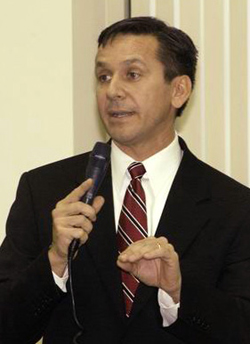“We’re marching on Baghdad,” quips state Senate Majority Leader Jim West, R-Spokane, as the GOP won another battle in its war on taxes last week. Democrats admit their troops are badly divided but still predict victory in their effort to save hundreds of millions in funding for health care and education.
On Friday, April 4, the state Senate’s Republicans, led by Ways and Means Chair Dino Rossi, R-Issaquah, picked up four Democratic votes to bolster their slim Senate majority and pass a no-new-taxes budget 28-20. Rossi closed a $2.6 billion deficit to propose a $22.8 billion two-year budget without any general tax increases. The proposal now goes to the state House, which is narrowly controlled, 52-46, by the Democrats.
Advocacy groups and labor unions immediately began to howl, pointing out the unkindest cuts in the Republican budget—providing 76,000 fewer low- income people (including 46,000 children) with health insurance, stopping prenatal care for undocumented immigrants, reducing the state workforce by 2,300, suspending popular initiatives that mandated lower class sizes and higher teacher pay, and freezing pay for most state workers.
Ironically, Gov. Gary Locke, who had released his own no-new-taxes budget last year, joined in the outcry against the Republicans’ proposal, saying, “I’m troubled by deep cuts in health programs for children.” Republicans chortled while watching Locke wrestle with the no-new-taxes genie that he let out of the bottle with his December budget. GOP leaders pointed out that while they cut children’s health programs more deeply than Locke, the Republicans restored $150 million that the governor had cut from services for those who are mentally ill, developmentally disabled, or in nursing homes.
The Republicans’ success in passing a budget was unexpected. Before the legislative session began, pundits and politicians predicted that the Senate Republicans would be unable to hold their caucus together to slash education and health care by hundreds of millions of dollars. Rossi did it the old-fashioned way—one vote at a time. He took the governor’s template and then found the specific programs that mattered to the individual senators whose votes he needed.
Consider a couple of bipartisan examples. State Sen. Don Carlson, R-Vancouver, is a moderate who has indicated he would support a temporary increase in the sales tax to solve the current fiscal crisis. Carlson, however, voted for Rossi’s budget, saying it “protects Washington’s scholars.” He specifically cited engineering and technology education programs in southwest Washington. State Sen. Marilyn Rasmussen, D-Eatonville, another moderate, elicited a promise from Rossi that that the governor’s cuts to the “Readiness to Learn” program that links education with other human- services providers would be restored.
“Dino is a star,” says West. “He’s willing to talk to anyone, anytime.”
Both Rasmussen and Carlson, however, said they did not expect Rossi’s budget to be the last one they voted on during this legislative session. While the House will vote on a budget next, most legislators expect a conference committee between the two chambers to eventually produce a compromise proposal that will require a second vote from both the House and the Senate.
Olympia’s Democratic leaders, who are among the Legislature’s most liberal members, are counting on moderates of both parties to eventually support a budget that increases taxes by $500 million to $700 million and cuts up to $2 billion.
Senate Minority Leader Lisa Brown, D-Spokane, says Locke will join Democratic leaders from the House and Senate in proposing new taxes soon. But will their troops follow them? Or will four Democrats in the House break ranks to join Republicans and pass a no-new-taxes budget to match the Senate’s?
House Majority Whip Sharon Tomiko Santos, D-Seattle, says there are House Democrats like herself who support comprehensive tax reform (code for an income tax) and others who believe “it would be silly to raise any taxes right now.” Santos asks rhetorically, “Are there the votes in my caucus to get out of here with some sort of revenue enhancement? There might be.”
Even if the Democrats do come up with enough votes to support $700 million in new revenues, it isn’t even half a loaf. The last serious deficit the state faced was a $1.4 billion gap in 1993. That year, half the deficit was closed with new taxes and half with cuts. This year, if everything goes the Democrats’ way, less than one-third of the deficit will come from tax increases. There is no better evidence of how successfully Tim Eyman’s anti-tax initiatives have altered Washington’s political landscape.








